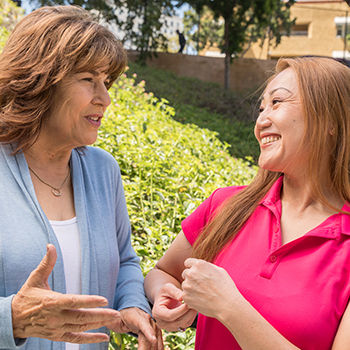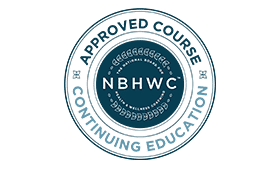Designed for health coaches, exercise professionals, and healthcare professionals, this interactive course provides the core coaching competencies and communication techniques you need to practice and refine your behavior change coaching skills for the most effective results.
Put your behavior change coaching skills into practice
The live virtual class portion of this course brings the learning experience to life from wherever you are, as you work alongside your peers to put the skills you learn into practice. An ACE Master Coach will lead the video-based classes and provide real-time feedback. Peer work will be done in large groups with opportunities to share learnings and critiques as well as in smaller breakout groups for closer collaboration and application.
Each week, you will watch videos and complete activities on your own in preparation for the live virtual classes via video conferencing. Please note that while mobile devices can be used, we recommend joining live virtual classes with a PC, laptop, or tablet for the best experience.
Deepen your understanding of client-centered care
This course focuses on the fundamentals of behavior change, core components of coaching, motivational interviewing and supporting an effective behavior change environment. With live virtual classes and access to ACE Master Coaches, you will leave with a network of like-minded professionals, deeper insights in behavior change coaching and effective strategies to set your clients and patients up for success.
Created by Rachele Pojednic, Ph.D, Ed.M., Assistant Professor of Nutrition at Simmons College and co-chair of the American College of Sports Medicine (ACSM) Exercise Is Medicine® education committee, you will go behind the philosophy of behavior change models so you can elicit more effective change. Dr. Pojednic is also a staff Scientist at BIDMC, Harvard Medical School and Interim Executive Director for the Prescription for Activity Task Force.
Upon completion, you will be able to:
-
Identify core coaching competencies required for effective behavior change coaching
-
Exemplify how motivational interviewing, cognitive behavioral coaching, strengths-based coaching and goal setting can be used to create an effective behavior change environment
-
Apply effective communication skills and learning principles to encourage a client-centered approach that empowers clients on their change journeys
-
Recognize several models of behavior change, including the transtheoretical model of behavior change, health belief model, social cognitive theory, self-determination theory and goal-setting theory
How do I complete this course?
You must complete all modules, which include 23 videos, weekly live virtual classes and activities, and six quizzes. The course meets twice a week for 5 weeks, for a total of 10 online classes. You must attend at least 7 of the 10 classes and earn 70% or higher on all six quizzes to meet the course completion criteria.
Curriculum
Want to dive even deeper?
We recommend pairing this course with Behavior Change Coaching Mentorship: Advanced Applications for the ultimate behavior change learning experience.
Learn MoreRegister today!
Next Course
Apr 29, 2025 - May 29, 2025
Tuesdays and Thursdays 1:00-3:00 pm PT
View Class ScheduleApril 28, 2025
Upcoming Course
Jun 9, 2025 - Jul 9, 2025
Mondays and Wednesdays 9:00-11:00 am PT
View Class ScheduleJune 8, 2025







